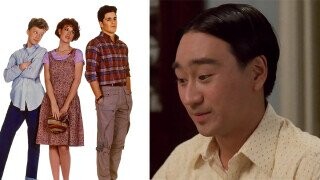Was ‘Sixteen Candles’ Racist? Gedde Watanabe Didn’t Think So At The Time

John Hughes movies as a rule haven’t aged well — just ask Molly Ringwald about Breakfast Club. But few characters are more problematic than Long Duk Dong, the horny Asian exchange student in Sixteen Candles played by Gedde Watanabe. (Cue GONG sound effect.)

As a young actor, Watanabe was just happy to get the work, he told PEOPLE. “Frankly I was like, this is a good job, and I’m going to get paid more doing one week in this movie that I did for all the years I was in the theater.”
Did Watanabe have second thoughts about playing such a stereotypical character? “It didn't really occur to me that it was a stereotype because there wasn't really anything out there for Asian actors at the time,” he says. “It was just so scarce. So I didn’t think it was stereotypical or racist. Isn’t that weird?”
Don't Miss
For better or worse, there could have been even more Dong. And Hughes being Hughes, it would have involved even more racial stereotypes with Dong performing a rap (circa mid-1980s) at the school dance. “It went something like, ‘I like Coca-Cola, lady skate roller, rock ’n’ rolla,” Watanabe says in the book You Couldn’t Ignore Me If You Tried: The Brat Pack, John Hughes, and Their Impact on a Generation. “Somehow, I sneak behind the podium in the gym. I get everybody dancing. I was really disappointed that they didn’t use it.”
These days, Watanabe admits he wasn’t completely blind to the character’s potential offensiveness. “I remember the movie using the word ‘Chinaman,’ and even then I was like, ‘Oh, that’s not great,’” he says. “But you also have to remember in that period of time, people still had to be educated about parameters, what the alarm bells were when it came to being offensive.”
Watanabe, who was born in Utah, got the role by learning a friend’s heavy accent. Because he stayed in character, Hughes had no idea that Watanabe didn’t really talk like Dong until he finally came clean during a table read. “(Hughes) totally burst out laughing,” he says. “He was in shock.”
The actor finally realized the impact of the character when he was approached years later at the Metropolitan Museum of Art. “This Asian woman came up to me and said, ‘How could you do that?’ She was really upset over the movie,” Watanabe says in You Couldn’t Ignore Me. “Back then I didn’t understand as much as I do now. I was a little bit ignorant, too, because I grew up in Utah. I had a very strange upbringing where I didn’t experience that much racism. I just thought I was a part of everybody else.”
Watanabe told PEOPLE that he believes Hughes at least played against stereotypes when Dong got a sexy American girlfriend. “That was really unusual in a sense, for the Asian character to get the girl and party and be in bliss like that.”